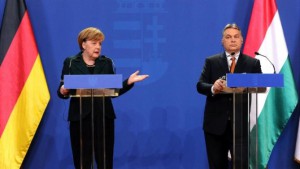Solange die Türkei nicht kooperiert, wird der Migrationsstrom nach Europa nicht beherrschbar sein / Von Michael Martens
ATHEN, 16. September. Auf dem Meer kann man keine Mauer bauen. Mit diesem simplen Satz ließe sich ein an diesem Donnerstag erscheinendes Positionspapier der „Europäischen Stabilitätsinitiative“ (ESI) zusammenfassen, einer Denkfabrik mit Hauptsitz in Berlin, deren Studien und Analysen seit 1999 die Debatte zu politischen Schlüsselthemen in Europa bereichern. In dem Aufsatz „Warum in der Ägäis Menschen ertrinken. Ein Vorschlag zu Grenzkontrolle und Asyl“ unterbreitet ESI-Chef Gerald Knaus einen Vorschlag, der helfen soll, die Masseneinwanderung nach Europa beherrschbar zu machen. Der Vorstoß lässt viele Fragen offen und wird nicht ohne Einwände bleiben, spricht aber einige wichtige Punkte an. Der wichtigste: Ohne die Mitarbeit der Türkei, die Europa nicht umsonst bekommen wird, können die Europäer noch so viele Mauern bauen, Polizisten oder gar Soldaten an ihre Grenzen schicken, Kontrollen einführen – es wird wenig ändern. Zwar können physische Demarkationen durchaus Teil einer Lösung sein und dürften es künftig in wachsendem Maße auch werden – doch sie ändern nichts an der topographischen Realität, die Griechenlands ostägäische Inseln bei der muslimischen Masseneinwanderung nach Europa spielen. „Die griechische Regierung kann nicht Schiffe versenken oder sie von den Küsten abdrängen. Das wäre illegal und gefährlich. Sie kann also nur warten, bis die Migranten ankommen; und sie muss sie retten, wenn sie auf See in Gefahr sind”, schreibt Knaus.
Damit ist die Ausgangslage beschrieben. Ein Zaun in der pannonischen Tiefebene oder ein Großaufgebot des in Bayern ändern zunächst einmal gar nichts daran, dass wie zuletzt im August mehr als 20.000 Migranten auf Lesbos, Kos und den anderen Inseln in Sichtweise der türkischen Küste anlanden. Um das zu verdeutlichen, lässt Knaus seinen Text am anderen Ende des Kontinents beginnen, in Finnland, dem EU-Mitglied mit der längsten Landaußengrenze des Schengen-Zone: 1340 Kilometer zu Russland. Finnlands Grenzschutz gilt als vorbildlich in Europa. Gesichtserkennungssoftware, modernste Methoden zum Erkennen gefälschter Pässe, umfassender Datenabgleich zwischen den Behörden, Bewegungsmelder, lückenlose Überwachung des Schiffsverkehrs in der Ostsee. So wurden 2013 denn auch nur 18 illegale Grenzübertritte in Finnland registriert. Nur war der Grund dafür nicht finnische Hochtechnologie sondern – Russland. Dort stehen noch aus Sowjetzeiten zwei je vier Meter hohe Grenzzäune, der Geheimdienst überwacht das Gebiet. Zäune machen also, im Unterschied zu dem, was meist behauptet wird, durchaus einen Unterschied – zumindest an Land und zumindest, solange Russland das will. Doch selbst wenn man den gesamten finnischen Grenzschutz nach Griechenland versetzt, wird der mit all seiner Technik nicht viel ändern können. Er wird die Migranten nur früher kommen sehen. „Letztlich hängt die Grenzkontrolle vor allem von den Nachbarn der EU ab und davon, ob diese willens und fähig dazu sind, potentielle illegale Migranten daran zu hindern, die Grenzen der EU überhaupt erst zu erreichen“, schlussfolgert Knaus.
Da kommt die Türkei ins Spiel. Das Land hat schon seit 2002 ein Rückführungsabkommen mit Griechenland, also einen Vertrag, der die türkischen Behörden verpflichtet, illegale Einwanderer, die aus der Türkei kommend griechischen Boden betreten haben, zurückzunehmen. Freilich weigert sich die Türkei, den Vertrag einzuhalten. Mehr als 9600 Anträge auf Rücknahme eines illegalen Einwanderers stellten griechischen Behörden 2014. Die Türkei nahm 6 (in Worten: sechs) zurück.
Doch ist das so unverständlich? Die Türkei, hat fast zwei Millionen Flüchtlinge aus Syrien aufgenommen, manche beherbergt sie seit Jahren. Die Vorstellung, dass die Türkei, die mehr syrische Flüchtlinge aufgenommen hat als ganz Europa zusammen, nun auch noch Zehntausende aus der EU zurücknimmt, nennt Knaus „vollkommen unrealistisch.“ Es sei denn die EU mache der Türkei ein außergewöhnliches Angebot. Knaus schlägt vor: „Die EU“ erklärt sich bereit, in den kommenden 12 Monaten eine Million Flüchtlinge aus Syrien (und nur von dort) aufzunehmen, die ihre Asylanträge noch in der Türkei abgeben können. Sie könnten dann legal mit dem Flugzeug nach Europa kommen statt ihr Leben auf Schlauchbooten zu riskieren. Die Türkei würde sich im Gegenzug verpflichten, das ab 2017 voll in Kraft tretende Rücknahmeabkommen mit der EU sofort anzuwenden. „Das bedeutet, sie würde jeden, der aus der Türkei kommend Lesbos oder Kos erreicht, am folgenden Tag zurücknehmen.“ Diese Doppellösung, so Knaus, würde das Geschäftsmodell der Menschenschmuggler in kurzer Zeit zerstören. Doch wie werden die Menschen in der EU verteilt? Und würde die Türkei ihren Part eines solchen Abkommens erfüllen? Wer traut noch dem Wort des Autokraten von Ankara, Tayyip Erdogan – selbst wenn der sein Wort gäbe? Solche und andere Einwände liegen auf der Hand. Klar ist aber auch, so Knaus: „Der Schlüssel, um die unkontrollierte Ankunft Hunderttausender Migranten und Asylbewerber in der EU zu stoppen, wird von der Türkei gehalten. Nur eine Strategie, die auf dieser Tatsache aufbaut, kann den Notstand beenden.“

